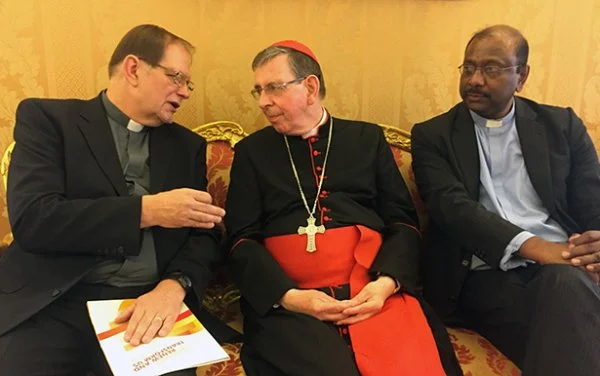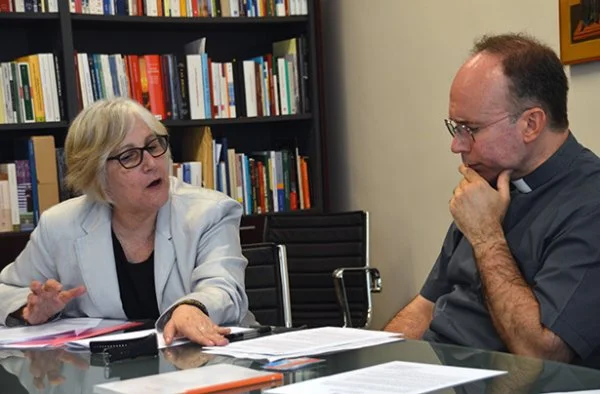- Français
- |
- Booklist
- |
- Week of Prayer
- |
- Links
- Areopagus - a forum for dialogue
- Academic journals
- Acronyms
- Bible tools
- Bibliographies
- Booksellers and publishers
- Churches
- Canadian church headquarters
- Directory of Saskatchewan churches
- Retreat centres
- Saskatchewan church and non-profit agencies
- Ecumenism.net Denominational links
- Anabaptist & Mennonite
- Anglican
- Baptist
- Evangelical
- Independent episcopal
- Lutheran
- Methodist, Wesleyan, and Holiness
- Miscellaneous
- Mormon
- Orthodox (Eastern & Oriental)
- Para-church ministries
- Pentecostal / charismatic
- Presbyterian & Reformed
- Quaker (Society of Friends)
- Roman & Eastern Catholic
- United and uniting
- Documents of Ecumenical Interest
- Ecumenical agencies
- Ecumenical Booklist
- Ecumenical Dialogues
- Glossary
- Human rights
- Inter-religious links
- Justice & peace
- Lectionaries
- Religious news services
- Resource pages
- Search Ecumenism.Net
- |
- Documents
- Ancient & Medieval texts
- Ecumenical Dialogues
- Interreligious
- Anabaptist & Mennonite
- Anglican
- Evangelical
- Lutheran
- Orthodox
- Reformed & Presbyterian
- Roman & Eastern Catholic
- United & Uniting
- Miscellaneous churches
- Canadian Council of Churches (CCC)
- Conference of European Churches (CEC)
- Interchurch Families International Network (IFIN)
- National Council of Churches in Australia (NCCA)
- Lausanne Committee for World Evangelism (LCWE)
- World Council of Churches (WCC)
- Other ecumenical documents
Church traditions
Documents from ecumenical agencies
- |
- Dialogues
- Adventist-Reformed
- African Instituted Churches-Reformed
- Anglican-Lutheran
- Anglican-Orthodox
- Anglican-Reformed
- Anglican-Roman Catholic
- Anglican-United/Uniting
- Baptist-Reformed
- Disciples of Christ-Reformed
- Disciples of Christ-Roman Catholic
- Evangelical-Roman Catholic
- Lutheran-Mennonite
- Lutheran-Mennonite-Roman Catholic
- Lutheran-Reformed
- Lutheran-Roman Catholic
- Mennonite-Reformed
- Mennonite-Roman Catholic
- Methodist-Reformed
- Methodist-Roman Catholic
- Oriental Orthodox-Reformed
- Orthodox-Reformed
- Orthodox-Roman Catholic
- Pentecostal-Reformed
- Prague Consultations
- REC-WARC Consultations
- Roman Catholic-Lutheran-Reformed
- Roman Catholic-Reformed
- Roman Catholic-United Church of Canada
- |
- Quick links
- Canadian Centre for Ecumenism
- Canadian Council of Churches
- Ecumenical Shared Ministries
- Ecumenism in Canada
- Interchurch Families International Network
- International Anglican-Roman Catholic Commission for Unity and Mission
- Kairos: Canadian Ecumenical Justice Initiatives
- North American Academy of Ecumenists
- Prairie Centre for Ecumenism
- Réseau œcuménique justice et paix
- Week of Prayer for Christian Unity
- Women's Interchurch Council of Canada
- World Council of Churches
- |
- Archives
- |
- About us
Common commitments to witness and action between WCRC and Catholic Church
— June 13, 201613 juin 2016The relationship between the World Communion of Reformed Churches (WCRC) and the Roman Catholic Church was both broadened and deepened during a series of meetings at the Vatican on Friday, 10 June. WCRC and Roman Catholic officials, including Pope Francis, found reasons for celebration as well as a renewed urgency to work more closely together.
“It was both a joy and a mission fulfilled today to have a strong response from Pope Francis to affirm our common mission,” said Chris Ferguson, WCRC general secretary.
In his official address to Pope Francis, Ferguson stated that it was with a sense of both “joy and urgency” that these meetings were taking place. “Our joy comes from knowing that through repentance and dialogue we are growing closer to the unity that is Christ’s gift to the church, so that all may believe,” he said, noting the progress made through official dialogues and the process of associating with the Joint Declaration on the Doctrine of Justification (JDDJ).
“Together we celebrate your reaching out to the Waldensian Church and all other signs on both our parts to overcome divisions through repentance and respectful dialogue,” Ferguson added. “We come today to wholeheartedly reconfirm that ecumenical vision and our commitment to visible unity and Christian witness.”
“And now comes the urgency!” Ferguson continued. “Sent in the Spirit of God’s love, mercy and compassion we cannot hesitate but must move decisively forward together in the face of the perils and suffering confronting this world and all her people.” He drew parallels between the commitments of both the WCRC and the Roman Catholic Church to social justice, citing the Accra Confession and Laudato Si’.
“Our faith in Jesus impels us to live charity through concrete gestures capable of affecting our way of life, our relationships and the world around us,” said Pope Francis, in his prepared remarks to the WCRC delegation. “…[T]here are many areas in which Reformed and Catholics can work together in bearing witness to God’s merciful love, which is the true remedy for the confusion and indifference that seem to surround us.”
“There is urgent need for an ecumenism that, along with theological dialogue aimed at settling traditional doctrinal disagreements between Christians, can promote a shared mission of evangelization and service,” said Pope Francis.
“We need to have theological discussions,” agreed Jerry Pillay, WCRC president, “but we also need to talk about our service and witness in the world. I think it’s because of that common vision that we are able to link and connect more tightly to work together.”
The WCRC delegation also met with members of the Pontifical Council for the Promotion of Christian Unity (PCPCU) and the Pontifical Council for Justice and Peace (PCJP).
The WCRC has held a series of formal dialogues with the PCPCU, the fourth of which is finishing its work with a report—Justification and Sacramentality: The Christian Community as an Agent for Justice—which will be released in the coming year.
Once the report is finished it can be used “in our churches to foster a spirit that will be open to a more concrete collaboration—in the sense that when we talk about justice and action we have to consider the relationship between the universal and the local, which becomes the place where these practical applications can actually take on flesh,” said Bishop Brian Farrell, PCPCU secretary.
“There’s a sense of hope that this fourth phase provoked some ways forward and asked some questions for the future,” said Aruna Gnanadason, WCRC consultant for theology. “It emphasized that our discussion could be about more visible unity rather than just doctrinal issues, what we together move more into practical engagement. We are looking forward to deciding on next steps.”
“Your association to the JDDJ is very important also for us,” said Cardinal Kurt Koch, PCPCU president. “These are very important questions also for our dialogues in the future. We have many questions to deepen in further dialogue and how we can seek common witness.”
“We see 2017 as a fantastic opportunity to be able to say here is a sign of visible unity and agreement that we can move forward and work together,” said Pillay. “We understand the Reformation with its great sense of diversity, it’s multiplicity of events—Luther, Calvin, Zwingli, Knox—and unity becomes a significant part of that.”
The meeting with the PCJP focused on areas of possible convergence on issues of common interest, as both sides introduced themselves to each other. The wide-ranging discussion included topics such as the “economy of life,” “virtuous entrepreneurship,” and other ways in which theologically-based development could ensure the just inclusion of all and the stewardship of God’s creation—with many comparisons drawn between the Accra Confession and Laudato Si’.
“There are many potential spaces for us to work together—practically, systematically and theologically,” said Dora Arce Valentin, WCRC executive secretary for justice and partnership. “We trust that today’s opportunity to understand each other better in areas of justice and peace build common paths to respond prophetically to our common call to be witnesses of Jesus Christ, building his Kingdom here and now in this world that God loves so much.”
The full WCRC delegation included: Rev. Dr. Jerry Pillay, WCRC president; Rev. Chris Ferguson, WCRC general secretary; Rev. Dora Arce Valentin, WCRC executive secretary for justice; Dr. Aruna Gnanadason, WCRC consultant for theology; Elder Gabriela Mulder, president of AIPRAL (Alianza de Iglesias Presbiterianas y Reformadas de América Latina y el Caribe); Rev. Eugenio Bernardini, moderator of the Tavola Valdese; and Phil Tanis, WCRC executive secretary for communications.

 Permanent link: ecumenism.net/?p=9401
Permanent link: ecumenism.net/?p=9401
Categories: Communiqué, News • In this article: Dicastery for Justice and Peace, Dicastery for Promoting Christian Unity, Reformed churches, World Communion of Reformed Churches

 Lien permanente : ecumenism.net/?p=9401
Lien permanente : ecumenism.net/?p=9401
Catégorie : Communiqué, News • Dans cet article : Dicastery for Justice and Peace, Dicastery for Promoting Christian Unity, Reformed churches, World Communion of Reformed Churches





